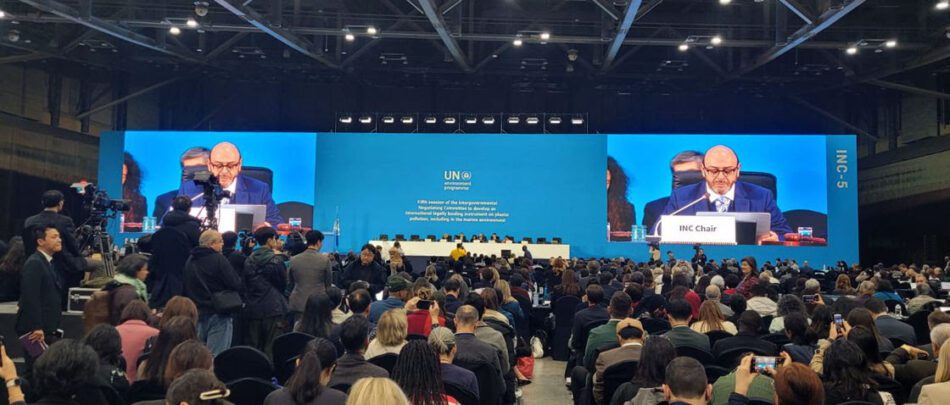OECS Joins Global Talks for Groundbreaking Plastic Pollution Treaty
From OECS Communications

Plastic pollution poses a significant environmental threat to ecosystems worldwide, and the United Nations has recognised the urgent need to address this issue to ensure environmental sustainability. The Organisation of Eastern Caribbean States (OECS) Commission, in collaboration with its partners, has been working diligently to address this issue. Currently, OECS representatives are participating in the fifth session of the Intergovernmental Negotiating Committee (INC-5), aimed at developing an international legally binding instrument on plastic pollution. The session is being held at the Busan Exhibition and Convention Centre in the Republic of Korea.
This session will run from November 25 to 1 December 1, 2024, and is expected to culminate in a legally binding treaty to control plastic pollution, including in the marine environment. Throughout the INC process, which commenced in mid-2022, Small Island Developing States (SIDS), including Member States of the OECS have called for an ambitious, comprehensive, and all-encompassing United Nations treaty on plastics that addresses issues related to the whole lifecycle of plastics.
In her opening remarks at the Convention, Inger Andersen, Executive Director of the United Nations Environment Programme (UNEP), highlighted the urgency of action to combat plastic pollution. She referenced a poignant letter from Miles Kariuki, one of 10,000 Kenyan children who wrote to the Intergovernmental Negotiating Committee (INC), pleading for decisive measures to protect their future. Andersen noted that November 25, 2024, marks 1,000 days since the adoption of UN Environment Assembly Resolution 5/14, which mandated the UNEP Executive Director to convene the INC to develop an international, legally binding instrument on plastic pollution. The resolution set a goal for the committee to complete its work by the end of 2024.
She urged the delegations from 175 countries to negotiate in good faith but not lower the bar so the treaty becomes meaningless. South Korea’s Environment Minister Kim Wan-sup added, “We must end plastic pollution before plastic pollution ends us,” while the Executive Secretary of the INC on Plastic Pollution stated, “Once the ink is dry, words must be followed by action.”

Several countries expressed concern about the possible invocation of Rule 38 of the Draft rules of procedure for the work of the intergovernmental negotiating committee to develop an international, legally binding instrument on plastic pollution, including in the marine environment. This Rule, while not yet adopted by the Meeting, indicates that if all efforts to reach consensus have been exhausted and no agreement has been reached, the decision shall, as a last resort, be taken by a two-thirds majority of the representatives of Members who are present and voting. However, countries emphasised the importance of making all decisions by consensus.
The Opening Statement by Samoa on behalf of the 39 Small Island Developing States (SIDS) represented by the Alliance of Small Island States (AOSIS), acknowledged the Chair’s efforts in producing the non-papers intended to reflect the broad range of views on the elements to be negotiated under the future instrument. However, it was highlighted that several key elements, specific to SIDS interests, were either missing or underdeveloped in the draft text.
SIDS reiterated that the special circumstances of their nations must be reflected accurately in the final agreement. They further continued to call for clear, legally binding obligations for the remediation of existing plastic pollution in the marine environment, including in areas beyond national jurisdiction; obligations on Abandoned, Lost, or otherwise Discarded Fishing Gear; the institutions and processes that allow the agreement to evolve and become more ambitious over time be in the agreement text; and clear obligation for developed countries to provide new, additional, accessible, sufficient and predictable finance to developing countries, particularly SIDS and LDCs.
“Throughout the INC, as well as the non-paper process, however, SIDS have reiterated our calls for several key elements that were either missing or underdeveloped in the non-papers. SIDS are severely disadvantaged by global environmental challenges that we do not cause. A multilateral negotiation process that does not incorporate our interests adds insult to injury. We wish to make clear this week: we will not accept a “take it or leave it” text here at INC5.” – Statement from AOSIS –
The OECS Commission is represented at the negotiations by Susanna Scott, Officer in Charge of the Sustainable Ocean Management Programme, and Farzana Yusuf-Leon, Technical Officer. The team hopes these negotiations will conclude successfully, resulting in a Treaty that effectively empowers SIDS to tackle the pressing issue of plastic pollution. Currently, the OECS is executing the Recycle OECS Project. It is funded by the European Union under the EU-Caribbean partnership for cooperation in the field of circular economy and solid waste management, and implemented by the OECS Commission in collaboration with the Agence Française de Développement (AFD).
Danny Moonie
Communications / Knowledge Management Specialist, Organisation of Eastern Caribbean States
OECS Communications Unit
Organisation of Eastern Caribbean States





